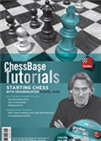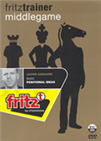"[Chess] makes man wiser and far-sighted."
— Vladimir Putin, during the 2001 World Championship knockout in Moscow
Many people feel that playing chess is a waste of time. Only the chess aficionados can experience the pleasure that is gained by playing chess. The pleasure of finding the best move, playing in a competitive spirit, trying for a win, trying to recover from a blunder and finally winning the game can be perceived as a struggle but it is pleasurable for a chess enthusiast. Others may call it masochism. Is it only pleasure that can be gained by playing chess? No. The principles that we learn in chess can also be applied to our life. Let us see how the principles of chess are extremely relevant to our life and can help us to improve and progress.
Three phases of the game  Chess is the ultimate board game. It has been played for over 1500 years and, thanks to the internet, is becoming more and more popular. People from all over the world meet online to enjoy chess — to play, to learn and to spectate major tournaments. With this DVD you can learn chess from scratch and join the world wide chess community. Daniel King, an experienced Grandmaster, teaches you in easy-to-follow videos all you need to get started: how to set up the board, how the pieces move and how to checkmate. After the basics, you’ll learn about the best way to begin the game, about the most common tactical motifs, and you’ll see how winning pieces can eventually help you to win a game. At the end of the course you can play through games by some of the world’s greatest chess players and learn from their strategies.
Chess is the ultimate board game. It has been played for over 1500 years and, thanks to the internet, is becoming more and more popular. People from all over the world meet online to enjoy chess — to play, to learn and to spectate major tournaments. With this DVD you can learn chess from scratch and join the world wide chess community. Daniel King, an experienced Grandmaster, teaches you in easy-to-follow videos all you need to get started: how to set up the board, how the pieces move and how to checkmate. After the basics, you’ll learn about the best way to begin the game, about the most common tactical motifs, and you’ll see how winning pieces can eventually help you to win a game. At the end of the course you can play through games by some of the world’s greatest chess players and learn from their strategies.
“After a bad opening, there is hope for the middle game. After a bad middle game, there is hope for the endgame.” – Edmar Mednis
Chess has three phases: the opening, the middle game and the endgame. Life also has the corresponding phases of student life, work life and retirement. A good opening play leads to better middle game positions and good middle game play can lead to a favourable endgame position. Every phase of chess play and of life is important. We need to make the most of each phase and also not get disheartened if some phase does not turn out good. We can make the next phase good.

Playing what the board dictates
The play can turn out to be tactical or strategic. We need to be prepared to play in whichever way the game develops. Our choice or mood should not matter. Likewise what we plan in life and what happens in life is at times very different. We need to be ready to face life as it comes and not grumble about it.
King safety
"Castle early and often” — Rob Sillars
The safety of the King takes priority over everything else in all stages of the game. Similarly, we should take care of our health. Any health harming habit is like not bothering about king safety and exposing the king to attacks. Health should be given a priority in all stages of our life.
Avoiding blunders
"The blunders are all there on the board, waiting to be made." — Savielly Tartakower
Blunders are costly. Most games are lost by blunders. Every serious chess player makes an earnest effort to avoid blunders. In life we need to proactively identify and avoid blunders which may cause great damage to us.
Avoiding loss of tempo
Developing pawns and pieces to the best squares as quickly as possible is an important principle of the opening phase. Every move should be done with a purpose and with the intention of fulfilling our plan. Tempo should not be wasted in any phase of the game. Similarly one should not waste time in life. Every action of ours should be with a purpose and in the direction of achieving our goals.
Finding the best move
“One bad move nullifies forty good ones.” – Israel Albert Horowitz
Every move is important. A chess player always tries to find the best move in any given situation. The best move is found by considering alternatives and evaluating likely future positions. Likewise in life, we should always make conscious efforts to find the best course of action at any given time.
Improving piece position
“Tactics flow from a superior position” — Bobby Fischer
A chess player is always on the lookout for an opportunity to place his pieces on a good outpost or on squares from where they are controlling an open file or an open diagonal. Similarly, in life we should actively look for actions which will improve our position and open up new opportunities.
Exchanging bad pieces
 Jacob Aagaard teaches in six lectures important principles of positional play.
Jacob Aagaard teaches in six lectures important principles of positional play. The pieces need to be developed to the best squares. The piece which cannot be developed to a good square is called a bad piece and is a liability. It should be got rid of. Similarly in life, whatever activities are not useful to us should be dropped.

The positional exchange sacrifice is one of the most powerful and fascinating strategic weapons in chess. On this DVD Sergey Tiviakov explains why the positional exchange sacrifice is such a strong weapon and how to use it.
Sacrificing
Position is superior to material. Hence a chess player does not hesitate to sacrifice material either for a win or to defend the position. Similarly, we should be conscious of the priorities of our life and sacrifice whatever needs to be sacrificed for a better life.
Preventing Time trouble
A good chess player uses his time wisely. He uses more thinking time for the critical moments in the game. We also need to use time wisely in our life by allocating more time to important and productive activities and not wasting much time on unproductive activities.
Planning
“Even a poor plan is better than no plan at all.” — Mikhail Chigorin
Chess teaches us to look ahead and plan. We can use this skill to progress in life.
Planning is the most difficult part of the game of chess. It is everywhere - we use it from the opening to the ending. A plan is based on evaluation and that evaluation is based on the different static and dynamic elements of the position. But what the chess books don’t describe is the direction of the plan.
Prioritising
"Tactics is knowing what to do when there is something to do; strategy is knowing what to do when there is nothing to do.” — Savielly Tartakower
At any point in the game there are many possible plans. Chess trains us to prioritise and focus on the most important threat or the most important plan. This skill of prioritizing will help us in our life when we are faced with many options. We will be able to choose the most beneficial option.
Concentration
Chess games go on for hours and a chess player has to be able to maintain the concentration for a long time. This ability to concentrate will help in any other arena of life.
Fighting spirit
“Nobody ever won a chess game by resigning.” – Savielly Tartakower
A fighting spirit and a never say die attitude is developed by playing chess. Such an attitude is needed to weather the storms of life.
Positive thinking
"Tonight, I am playing against the Black pieces" — Akiba Rubinstein
Good chess play happens when you are not focused on the ELO rating of the opponent. Even if the opponent is a stronger rated player, a positive mindset can help a player to perform the best. Such positive attitude is needed in life to be able to do our best in adverse circumstances.
Learning from failures
"You may learn much more from a game you lose than from a game you win. You will have to lose hundreds of games before becoming a good player." — José Raúl Capablanca
Though a chess player wants to win every game, losses are inevitable. A chess player can grow by analysing his losses. Similarly failures are inevitable in our life. We need to learn from the mistakes that we make in our life. Only a dispassionate analysis of our behavior or events happening in our life can help us to avoid same mistakes in future and thereby accelerate our progress.

This story originally appeared on ChessBase India
Photos: Amruta Mokal | Wfm lewis chessmen | Chess Pieces by the sea
























